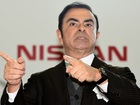Hizbullah lost at least eight fighters in northwest Syria in skirmishes with insurgents and airstrikes by Turkey's air force, an opposition war monitor and the Iran-backed group said.
The casualties followed the death of at least 33 Turkish soldiers earlier this week.
 Full Story
Full Story
Japan has said it would send a deputy justice minister to Lebanon after failed attempts to get former Nissan chief Carlos Ghosn to return for trial on financial misconduct charges.
 Full Story
Full Story
One member of the Lebanese Army was killed and a second was injured on Saturday in an ambush in the al-Shawagir area in Hermel, the National News Agency reported on Saturday.
A statement released by the Army’s Orientation Directorate said the two soldiers were heading via their vehicle to visit someone in Hermel, when their car was ambushed by gunmen.
 Full Story
Full Story
Saudi Arabia on Saturday called on Saudi nationals to postpone unnecessary travel to Lebanon amid concerns over coronavirus.
 Full Story
Full Story
Grand Mufti of the Republic Sheikh Abdul Latif Daryan hailed Saudi Arabia’s decision banning entry to Islam's holiest cities amid fears over the new coronavirus, the National News Agency said on Saturday.
 Full Story
Full Story
Health Minister Hamad Hassan on Saturday ordered the closure of daycare centers in Lebanon starting February 29 and ending March 8 as a precaution against the spread of the COVID-19 coronavirus, the National News Agency reported.
 Full Story
Full Story
Education Minister Tarek al-Majzoub on Friday ordered the closure of all educational institutions in the country for a week as a precaution against the spread of the COVID-19 coronavirus.
 Full Story
Full Story
The Lebanese government had frozen recruitment but then, around the time of a key election, thousands of people suddenly landed civil servant jobs.
 Full Story
Full Story
Every year the Lebanese capital's parking meters generate the equivalent of six million dollars, but the municipality on whose soil most operate says it has yet to see a penny.
 Full Story
Full Story
Minister of Public Works and Transport Michel Najjar issued a statement on Friday suspending travel to Lebanon from countries infected with the coronavirus disease, the Minister’s media office said in a statement.
 Full Story
Full Story



